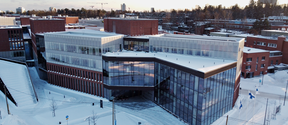Satu Lähteenoja: ‘Futures thinking and co-design are needed for advancing sustainability transformations'

What is your doctoral thesis about?
‘My work is driven by a concern for the environment and the future. We need a thorough and rapid sustainability transformation to address major sustainability challenges such as mitigating climate change, halting biodiversity loss and tackling inequality. At the same time, I have been frustrated by the preference for policies that put the economy first and take a short-term perspective.
During my studies, I became interested in collaborative design and in how it can help people to better understand systemic changes and look further into the future – and see what needs to be done to get to the desired future. In my work, I had a closer look at the sustainable development policies: countries are committed to achieving the UN Sustainable Development Goals by 2030, but so far no country seems to be meeting all the targets.
In my doctoral research, I developed further the transition arena method, originally developed in the Netherlands, to help ministries, cities and policy-makers to visualise systemic changes related to sustainable development. The original transition arena had a horizon of 40–80 years, but such a long perspective is easily too abstract. At Aalto University, the method has been applied over a mid-range horizon of around 10–15 years.
In practice, the method is a series of workshops for a selected group of experts and frontrunners in different fields on a given topic. They are involved in visioning and setting objectives related to the theme, as well as creating future paths on how to achieve the objectives. The workshops will result in concrete recommendations for action to feed into policy making. In my work, I developed the method further so that it is also suitable for use in formal policy processes.’
Satu LähteenojaThis kind of forward-looking and co-designing way of working should be integrated into sustainability policy processes at an agenda setting stage, while outlining what are the important issues to be addressed."
What is important about it?
‘What is important is that the co-design methods allow participants themselves to think deeply about the key issues and what should be done about them, and that they are given the opportunity to think far enough ahead. I had the opportunity to test this method with the Prime Minister's Office in Finland, in the context of updating the national sustainable development strategy. It involved the 60 members of the Sustainable Development Committee, for whom this was a very new way of working. They co-created positive visions for the future and medium-term change paths on how Finland will achieve the SDGs.
The strategy was published in 2022 and includes themes and new thinking that are relevant to the sustainability transformations, such as the idea that human and natural capital should be considered in the same way as economic capital. The Sustainable Development Committee is putting the strategy into practice, and its areas for change have served as a basis for sustainability work in many other organisations. In addition, the transition arena approach has also been used in the preparation of the National Biodiversity Strategy.
As part of my doctoral research, I interviewed people who have participated in the Transition Arena workshops. The feedback shows that the method helps people to understand both the agency of different actors and their own role in the transition. The results also show that the method can provide a space for facilitated discussions on difficult topics such as conflicts of interest. It also offers empowerment and a realisation that we can do much more than we thought we could in terms of sustainable development.’
What can it lead to?
‘Forward-looking co-design methods have been developed and studied, but they have been mostly separate from formal policy processes. In my doctoral thesis, I argue that this forward-looking and co-designing way of working should be integrated into sustainability policy processes at an agenda setting stage, while outlining what are the important issues to be addressed. The use of researchers and science-based knowledge is important as part of it.
The policy recommendations that emerge from the work and how they are reflected in policy-making are not the only output and impact, but what people learn in the process is also essential. That impact can only be seen years later and perhaps entirely somewhere else. It is likewise important that people become more empowered and understand the importance of their own contribution.
I am not saying that co-design alone will solve the sustainability challenges, but one rapid transformation is not foreseen, it is important to look for small wins as well as larger change. Both are needed, and small steps can pave the way for bigger change when there is room in the political climate to advance them.
I have worked with the method mostly at ministerial level, but it is equally suited to cities. Cities have an important role to play in addressing sustainability topics.’
Satu Lähteenoja's doctoral thesis Advancing sustainability transformations – Co-design for sustainable development policies was examined at Aalto University on 14 June 2024.
- Published:
- Updated:
Read more news

New origami packaging technology creates sustainable and eye-catching alternatives to conventional packing materials
Origami packaging enables completely new properties for cartonboard, making it an excellent alternative to, for example, plastic and expanded polystyrene in packaging. The aesthetics of the material have also garnered interest from designers.
Quantum physics professor searches for exotic qubit alternatives with new European funding
Aalto University physics professor Jose Lado will use this funding to engineer a new type of topological quantum material that could have applications for quantum bit, or “qubit,” development for noise-resilient topological quantum computation.
Talvikki Hovatta wants to solve a mystery that has plagued astronomers for decades
A new receiver at the Metsähovi Radio Observatory and ERC funding from the European Research Council will enable research into the composition of relativistic jets launched by supermassive black holes